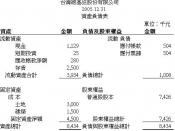Over the years, the accounting profession evolved without a defined set of guiding principles. Confusion often arose as different firms used varying methods to correct similar problems. This made comparison of financial reports between companies and over time difficult, as information was interpreted in different ways by different people. For these reason, c conceptual framework, in the form of a number of concept statement, is being developed to provide a set of guiding principles for the accounting profession.
Accountants themselves have developed traditional ways of doing things. This is reflected in the Accounting Conventions, which are generally accepted accounting principles which have been used for many years. These conventions (or accepted practices) include those described below.
The entity concept (business - entity concept). Under the business entity concept, for accounting purposes, every business is conceived to be and is treated as a separate entity, separate and distinct from its owner or owners and from every other business.
Businesses are so conceived and treated because, in as far as a specific business is concerned, the purpose of accounting is to record its financial position and profitability. Consequently, the records and periodically report its financial position and should not include either the transactions or assets of another business or the personal assets and transactions of its owner or owners. To include either distorts the financial position and profitability of the business. For example, the personally owed automobile of a business owner should not be included among the assets of the owner's business. Likewise, its gas, oil and repairs should not be treated as an expense of the business, for to do so distort the reported financial position and profitability of the business.
It should be also made a clear distinction between accounting and legal entities. In some cases the two coincide. For...


